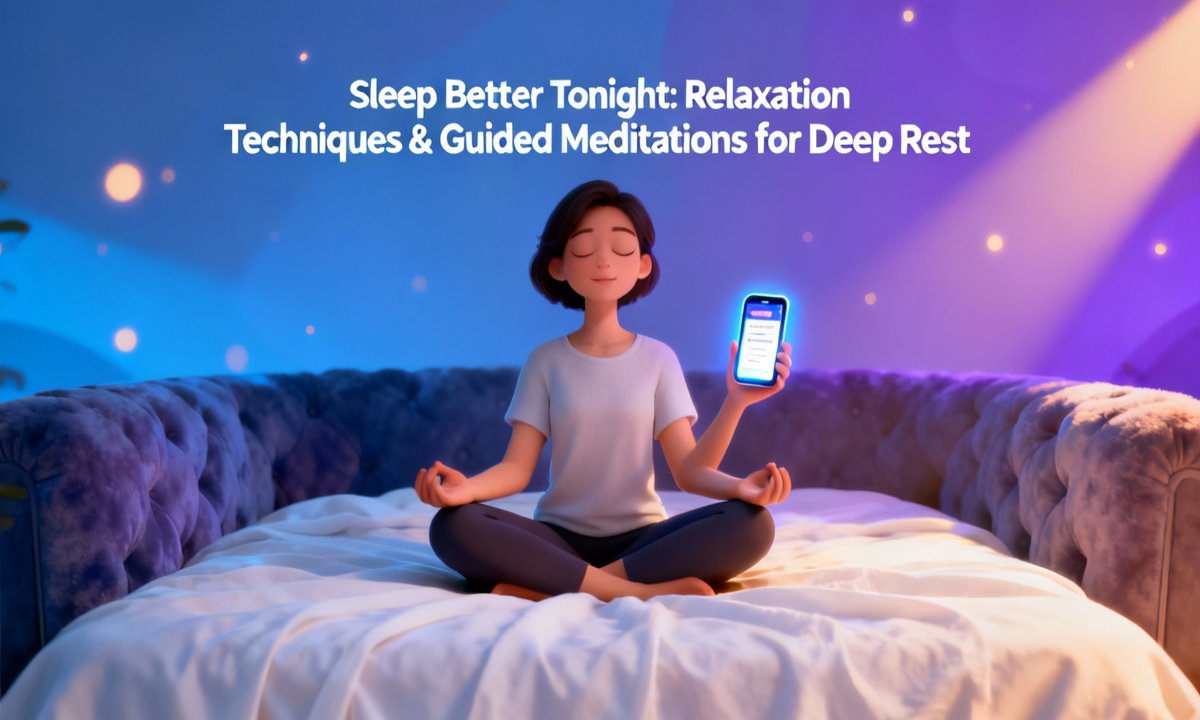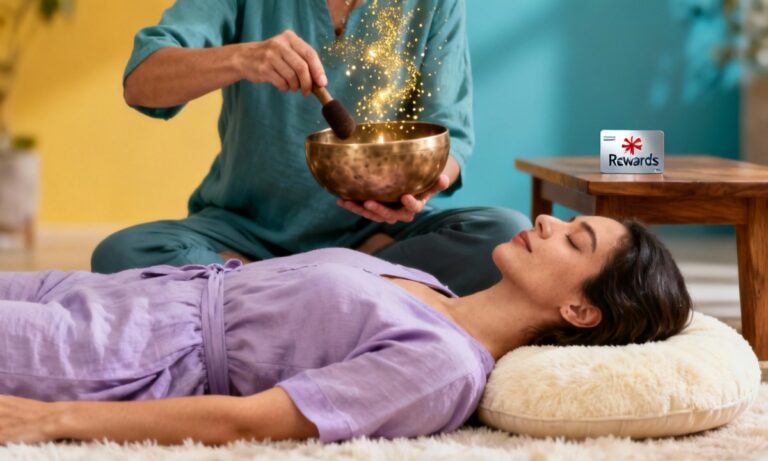Struggling to fall asleep or stay asleep? You’re certainly not alone. Modern life keeps our minds highly active, often resisting the necessary transition to rest at night. The good news is that scientific methods, like sleep relaxation techniques and guided meditations, can quiet your mind, ease your body, and help you wake up fully recharged for the day ahead.
The Science of Deep Rest and Restoration
Sleep is your body’s essential natural reset mechanism. Achieving deep rest goes far beyond simply feeling refreshed; it is crucial for physical recovery, strengthening your immune function, consolidating memory, and regulating your mood. Prioritizing restful sleep solutions is a direct investment in your long-term health and well-being. Poor sleep can increase stress, disrupt focus, and significantly diminish your daily energy.
How Relaxation Techniques Aid Deep Sleep
During the deep stages of rest, your brain actively repairs tissues, consolidates memories, and flushes cellular waste. Consistently reaching this restorative stage requires more than just sufficient time in bed. Intentional bedtime meditation and relaxing rituals signal to your body that it is time to power down and fully relax. Mindful routines can even serve as a natural aid for insomnia treatment by training the brain to fall asleep faster.
Top Relaxation Techniques for Deeper Slumber
Are you ready to discover how to sleep better tonight? These proven relaxation exercises are designed to prepare both your mind and body for achieving deep rest. Start by choosing one technique, or combine a few favorites for a personalized evening routine that genuinely works for you.
1. The 4-7-8 Breathing Technique
This simple and highly effective breathing exercise is a favorite for those seeking to fall asleep fast. It works by calming the nervous system and rapidly lowering your heart rate. Try following this powerful sequence to soothe your body for rest.
Step-by-Step 4-7-8 Guidance
Inhale deeply through your nose for four seconds, then hold your breath for seven seconds. Exhale slowly and completely for eight seconds to release tension. Repeating this cycle four times is a fast method to help calm your physiological arousal before sleeping. This technique calms the nervous system and lowers your heart rate.
2. Diaphragmatic (Belly) Breathing
Diaphragmatic breathing is a gentle way to efficiently reduce stress for sleep. Lie down comfortably and place one hand on your belly and the other on your chest. Focus on making your belly rise as you inhale deeply. Exhale slowly, focusing on the outward movement. This simple mindful practice can be easily paired with calming sleep music for even deeper relaxation.
3. Progressive Muscle Relaxation (PMR)
PMR involves systematically tensing and then releasing specific muscle groups, starting from your feet and working up to your face. Tense each group for about five seconds, and then consciously let go, feeling the distinct difference. This relaxation exercise is especially powerful if your body often carries physical tension after a demanding day. Clinical trials show PMR reliably aids in stress relief for sleep.
4. Guided Imagery and Visualization
If intrusive racing thoughts tend to keep you awake, guided imagery can provide a necessary distraction. Picture a tranquil and peaceful scene, like a gentle beach or a sunlit forest. Focus intently on the specific sights, sounds, and calming sensations of this mental place. Let your mind wander there and notice any worries slipping away. Guided meditations for sleep frequently use this technique; try listening to a favorite recording as a regular part of your evening routine for better sleep.
5. Non-Sleep Deep Rest (NSDR)
NSDR involves simple mindfulness for sleep: lie comfortably, close your eyes, and guide your focused attention through each body part. Breathe deeply with each specific area you consciously choose to relax. NSDR helps both your brain and body power down effectively, even if full sleep has not been achieved yet. Many people describe this as a deep rest meditation that benefits memory and neuroplasticity.
Integrating Guided Meditations for Peaceful Slumber
Guided meditations for sleep are among the most effective resources to transition from an overactive mind to peaceful slumber. These structured audio sessions use gentle music, soothing voices, and carefully structured relaxation cues. This format makes the process of letting go much easier for beginners.
Popular Types of Bedtime Meditation
Body scans: You are gently guided to notice and completely relax specific parts of your body, releasing all lingering physical tension.
Visualizations: These sessions encourage you to imagine specific peaceful settings or scenes of comfort and safety.
Compassion meditations: These are designed to nurture feelings of kindness and inner safety, which naturally releases emotional tension.
If you are new to the practice, try popular apps that offer specific bedtime meditations and targeted sleep improvement tips tailored to different needs.
Step-by-Step: Building Your Optimal Bedtime Routine
A highly consistent routine strongly supports healthy sleep hygiene and makes your chosen bedtime meditations significantly more effective. Here is a clear guide on how to create a wind-down process that truly works for you and supports deep rest.
1. Regulate Your Internal Clock
Aim to go to bed and wake up at approximately the same time every day, even on weekends. This regular practice helps to fully regulate your natural circadian rhythm and effectively reduces the risk of chronic insomnia.
2. Design Your Sleep Sanctuary
Your environment matters greatly. Keep your room consistently cool, dark, and quiet. You can boost comfort by thoughtfully optimizing your sleep environment. Consider decluttering your bedroom for peace of mind and investing in high-quality bedding materials. For a truly calming space, explore tips for a seasonal refresh of your bedroom.
3. Improve Air Quality for Rest
Poor air quality can subtly disrupt your breathing patterns and greatly lower your overall sleep quality. You can easily add sleep-supportive plants, such as the top indoor plants for better air. Alternatively, consider using a high-quality air purifier to maintain a fresh, healthy atmosphere while you sleep.
4. Limit Evening Stimulation
Dim the lights in your home one to two hours before you intend to sleep. It is vital to power down all screens (phones, tablets, TVs) at least an hour before bedtime, as blue light severely interrupts natural melatonin production. Try reading a physical book, gentle stretching, or listening to soft sleep music instead.
5. Incorporate Calming Aromatherapy
A few simple drops of lavender or chamomile essential oil can efficiently help you wind down and prepare for rest. You can combine aromatherapy with your chosen relaxation exercises for sleep to maximize the benefits and achieve a deeper state of calm.
6. Commit to a Wind-Down Ritual
Every single evening, make sure to practice one or two of the relaxation techniques discussed above. Activities like journaling, using meditation apps for sleep, or simply drinking caffeine-free herbal tea can signal clearly to your body that it is time to fully rest.
Addressing Common Sleep Challenges
Understanding the most common roadblocks to rest can help you tailor a perfect strategy for successful nights. Identifying the source of the interruption is the first step toward finding a lasting solution.
Trouble Falling Asleep
Many people struggle significantly to successfully unwind when they first get into bed. If this sounds familiar, prioritize breathing exercises for sleep and progressive muscle relaxation. These proven techniques can greatly shorten sleep onset time by effectively calming the nervous system and turning down unnecessary physiological arousal.
Difficulty Staying Asleep
Waking up in the middle of the night often results from stress or environmental disturbances. Ensure your bedroom fully supports rest by eliminating distracting noise and light interruptions. If you do wake, try NSDR or a short body scan meditation to gently ease yourself back toward deep sleep.
Managing Racing Thoughts and Anxiety
Anxious or rapid thoughts are an extremely common culprit for the frustrating symptoms of insomnia. Evening routines that consistently feature mindfulness for sleep and bedtime meditation are proven stress relief strategies. If anxiety persists, combine meditation with calming herbal teas or soft sleep music.
Optimizing Your Peaceful Sleep Environment
The physical space surrounding you dramatically affects your rest quality. Ensure your bedroom is tidy, organized, and free of clutter, perhaps utilizing smart storage solutions. Explore eco-chic decor ideas that can boost both comfort and tranquility. Even small, meaningful changes make a significant difference in achieving deep sleep quality.
Expert Insights: Frequently Asked Questions
It is natural to have questions when adopting new methods for improving your rest. These insights address common concerns to help you confidently begin your journey toward better sleep.
Starting Out with Relaxation Techniques
Start with simple steps and always listen closely to your body’s signals. If any technique feels uncomfortable, especially Progressive Muscle Relaxation (PMR), avoid tensing muscles to the point of pain. Guided meditations for sleep are highly recommended for beginners, allowing the instructions to naturally lead you toward rest.
Timeline for Seeing Results
For many individuals, improvement can be felt after a single night of mindful relaxation practice. However, achieving lasting and significant change comes only with consistency. Dedicate a few minutes nightly to your chosen deep rest practices, and consider tracking your progress using a sleep journal or monitoring tool.
Sleep Techniques vs. Medical Treatment
While deep rest meditation and focused breathing exercises offer significant sleep improvement tips, persistent or unexplained sleep disturbances should always be discussed with a healthcare professional. Underlying medical conditions or specific medications can sometimes seriously interfere with your ability to achieve restful sleep.
Safety and Risks
Most sleep relaxation techniques are entirely safe and beneficial for healthy adults. Always listen to your body’s comfort levels. Avoid forcing breath-holds or intense muscle contractions if you feel uncomfortable. If you are managing serious sleep disorders, consult your provider before starting a new relaxation regimen. Additional resources are available for relaxation therapies.
A Success Story: Finding Rest
One user shared, “I used to lie awake for hours, replaying my to-do list. Starting with just 10 minutes of guided deep breathing meditation was a true game-changer. After only two weeks, I could feel my mind instantly unwind as I settled into bed, and now I regularly wake feeling genuinely rested.”
If you have personally found success with any of these powerful routines, consider sharing your positive experience in the comments. Your story might inspire others who are seeking reliable restful sleep solutions.
Begin Your Journey to Deep Rest Tonight
Remember that even small, consistent lifestyle changes can lead to extremely meaningful improvements in your sleep quality. If you are ready for a deeper, more restorative sleep experience, commit to trying just one relaxation technique tonight and truly notice the difference tomorrow.
* Listen to Our Sleep Meditation: Press play on a restful night—subscribe to our newsletter for weekly wellness tips and free audio guides!
* Contact a Sleep Specialist: Personalized guidance is readily available to help you create a tailored plan for consistently restful nights.
Curious how your environment shapes your rest? Learn how a clean, organized bedroom can set the perfect tone for sleep and discover indoor plants that naturally purify air for a healthier, more tranquil space. Sweet dreams!
—
All advice is evidence-based—consult your healthcare provider for persistent or severe sleep issues.



